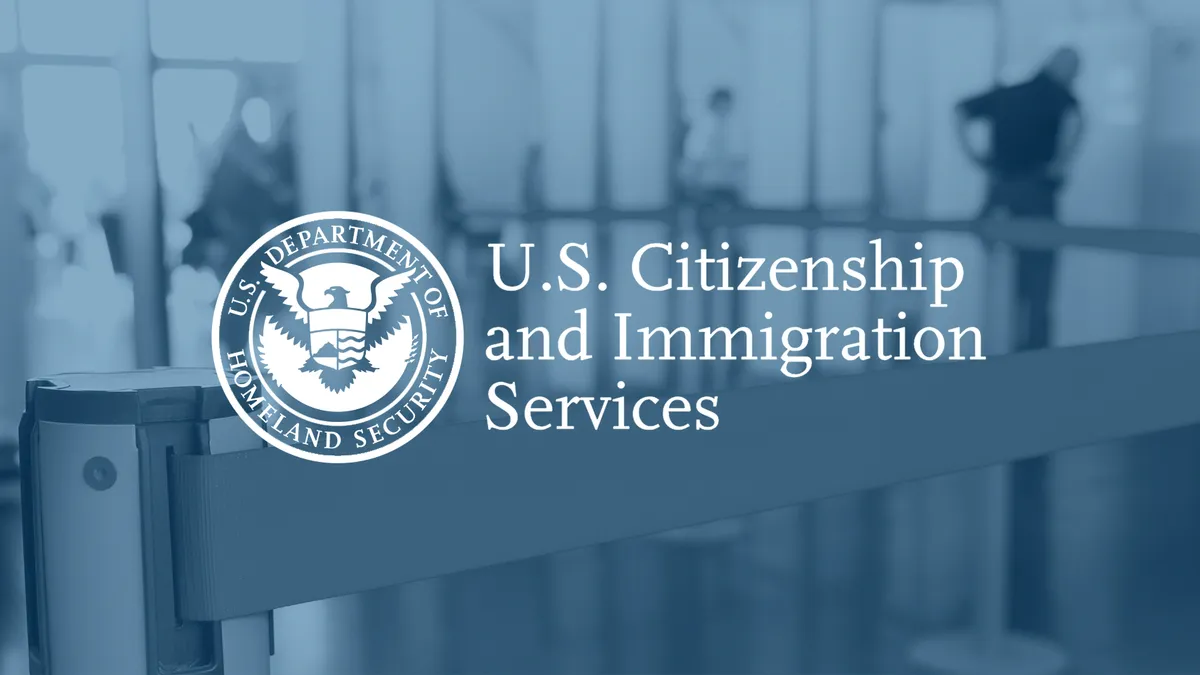Dive Brief:
- Users of a new U.S. Citizenship and Immigration Services (USCIS) electronic registration system, which allows employers to apply for H-1B visas for the 2021 fiscal year, have reported a number of technical glitches, and some say their registrations were incorrectly denied for being duplicate registrations.
- News of the denied registrations was reported April 2 by Forbes, which cited in part a client alert issued by the American Immigration Lawyers Association (AILA). In an email, Diane Rish, AILA's associate director of government relations, told HR Dive that USCIS had since informed AILA that the denied registrations were properly identified and invalidated, but she said AILA would continue to investigate the issue. Rish noted AILA members experienced other issues with the USCIS system, including blank screens, registrations simultaneously showing up as both "in progress" and "submitted," and incorrect notifications that an attorney was not eligible to practice law.
- "U.S. Citizenship and Immigration Services continues to review registrant inquiries related to system processing for H-1B registrations, and examines each inquiry individually, but the agency has not currently found any duplicate registration invalidations due to technical issues associated with the registration system," a USCIS spokesperson told HR Dive in an email.
Dive Insight:
The revamped USCIS registration system was first introduced for the fiscal year 2021 H-1B registration period beginning March 1 and ending March 20. The system was intended to make the process easier for employers, Richard Burke, CEO of Envoy Global, told HR Dive in an interview.
Previously, employers who applied for H-1B visas did so by submitting a complete application to USCIS. The application includes a filing fee. While employers whose applications were not selected to receive a visa could recoup the filing fee from USCIS, they generally incurred high costs, such as legal fees, associated with completing the application, Burke said. Under the new system, employers register with USCIS, and the agency then selects registrations that would be able to file H-1B petitions, subject to the agency's cap of 85,000 petitions.
Many AILA members who encountered issues with USCIS' registration process ultimately had those issues resolved, although many issues were time-consuming for those users, according to Rish. "While AILA acknowledges that this was the first year USCIS implemented the new H-1B electronic registration process, AILA hopes that USCIS will continue to make improvements to H-1B registration system in order to minimize the technical disruptions that occur during future H-1B cap-subject filing seasons," she said.
Aside from the registration issues, employers who employ H-1B visa holders are experiencing a number of difficulties caused by the ongoing COVID-19 pandemic, Burke said. Foreign workers still in the U.S. are "leery" of going back to their home countries to be with their families for fear of being unable to return to the U.S., he noted, while those who have already traveled to be with family members are encountering those same hurdles.
"Many companies have put in a hiring freeze," Burke said. "If you're a foreign national in a hiring process with a company, that process has slowed."
While terminations and furloughs are likely to impact foreign workers as well as U.S. citizens, Burke said it's difficult to quantify that impact at present. He said he is confident that once economic conditions improve, employers will still notice a shortage of qualified U.S. citizens who can fill in-demand roles, including those in the science, technology, engineering and mathematics (STEM) fields.














